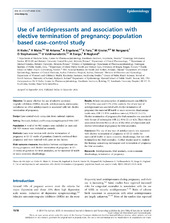| dc.contributor.author | Kieler, H | en_US |
| dc.contributor.author | Malm, H | en_US |
| dc.contributor.author | Artama, M | en_US |
| dc.contributor.author | Engeland, Anders | en_US |
| dc.contributor.author | Furu, Kari | en_US |
| dc.contributor.author | Gissler, Mika | en_US |
| dc.contributor.author | Nørgaard, M | en_US |
| dc.contributor.author | Stephansson, Olof | en_US |
| dc.contributor.author | Valdimarsdóttir, Unnur Anna | en_US |
| dc.contributor.author | Zoega, H | en_US |
| dc.contributor.author | Haglund, Bengt | en_US |
| dc.date.accessioned | 2016-03-31T09:58:07Z | |
| dc.date.available | 2016-03-31T09:58:07Z | |
| dc.date.issued | 2014-11-14 | |
| dc.Published | BJOG: an International Journal of Obstetrics and Gynaecology 2015, 122(12):1618-1624 | eng |
| dc.identifier.issn | 1471-0528 | |
| dc.identifier.uri | https://hdl.handle.net/1956/11784 | |
| dc.description.abstract | Objective To assess whether the use of selective serotonin reuptake inhibitors (SSRIs), tricyclic antidepressants, mirtazapine, venlafaxine or other antidepressants is associated with late elective termination of pregnancy. Design Case–control study using data from national registers. Setting Denmark,Finland, andNorwayduring the period 1996–2007. Population A total of 14 902 women were included as cases and 148 929 women were included as controls. Methods Cases were women with elective termination of pregnancy at 12–23 weeks of gestation. Controls continued their pregnancy and were matched with cases on key factors. Main outcome measures Association between antidepressant use during pregnancy and elective termination of pregnancy at 12– 23 weeks of gestation for fetal anomalies, or for maternal ill health or socio-economic disadvantage. Results At least one prescription of antidepressants was filled by 3.7% of the cases and 2.2% of the controls. Use of any type of antidepressant was associated with elective termination of pregnancy for maternal ill health or socio-economic disadvantage (odds ratio, OR 2.3; 95% confidence interval, 95% CI 2.0–2.5). Elective termination of pregnancy for fetal anomalies was associated with the use of mirtazapine (OR 2.2, 95% CI 1.1–4.5). There was no association between the use of any of the other antidepressants and elective termination of pregnancy for fetal anomalies. Conclusion The use of any type of antidepressants was associated with elective termination of pregnancy at 12–23 weeks for maternal ill health or socio-economic disadvantage, but not with terminations for fetal anomalies. Further studies need to confirm the findings concerning mirtazapine and termination of pregnancy for fetal anomalies. | en_US |
| dc.language.iso | eng | eng |
| dc.publisher | Wiley | eng |
| dc.rights | Attribution CC BY-NC-ND | eng |
| dc.rights.uri | http://creativecommons.org/licenses/by-nc-nd/4.0/ | eng |
| dc.subject | Antidepressants | eng |
| dc.subject | Fetal anomaly | eng |
| dc.subject | socio-economic disadvantage | eng |
| dc.subject | termination of pregnancy | eng |
| dc.title | Use of antidepressants and association with elective termination of pregnancy: population based case-control study | en_US |
| dc.type | Peer reviewed | |
| dc.type | Journal article | |
| dc.date.updated | 2015-12-30T17:14:48Z | |
| dc.description.version | publishedVersion | en_US |
| dc.rights.holder | Copyright 2014 the authors | |
| dc.identifier.doi | https://doi.org/10.1111/1471-0528.13164 | |
| dc.identifier.cristin | 1294085 | |

